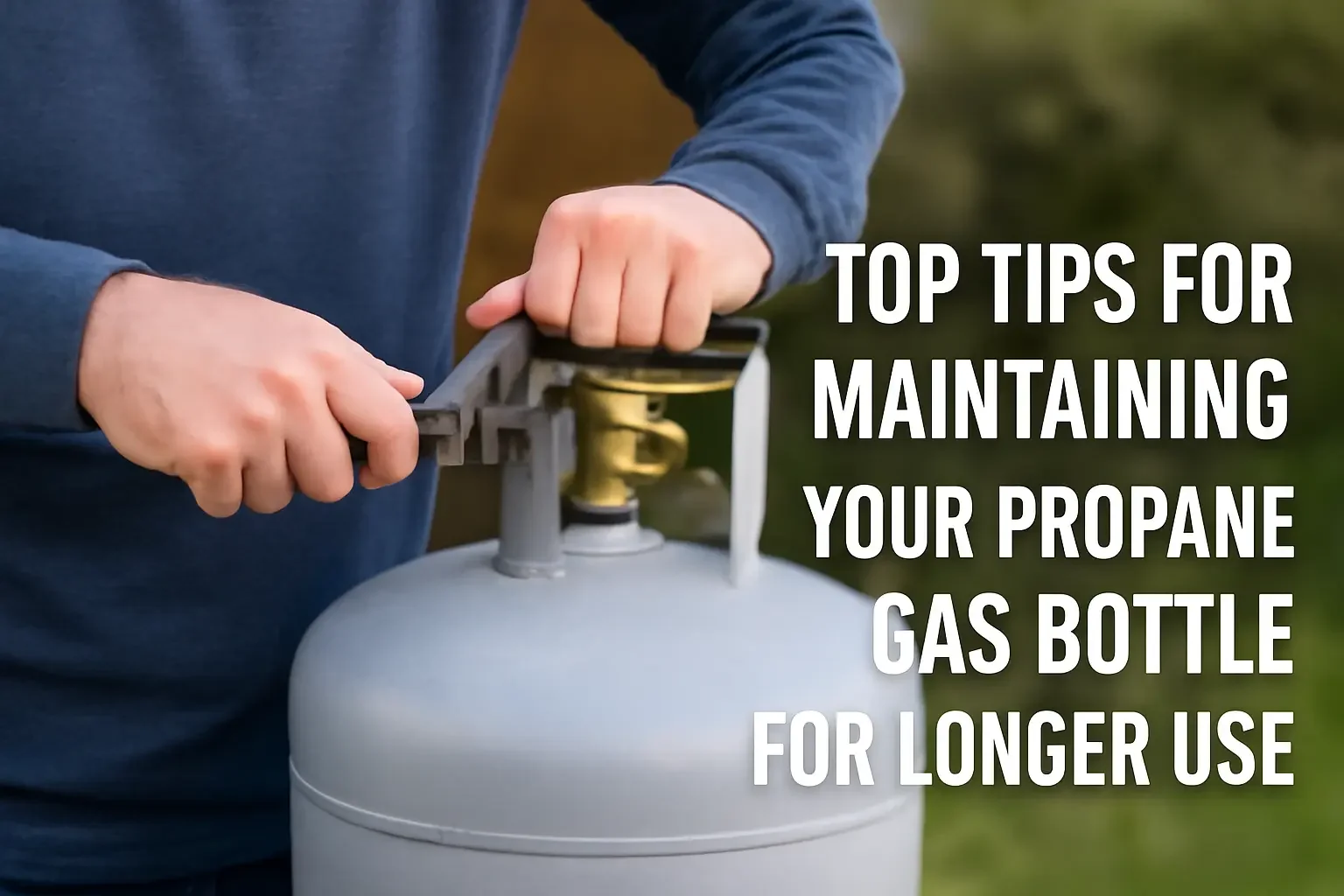Top Tips for Maintaining Your Propane Gas Bottle for Longer Use
Propane gas bottles are essential for various applications, from cooking and heating to powering outdoor appliances and vehicles. Maintaining these bottles properly ensures safe usage, longer lifespan, and optimal performance. Whether you're using a propane gas bottle for camping, heating your home, or powering your barbecue, it’s crucial to understand how to maintain them for safety and efficiency.
1. Store Your Propane Gas Bottle Properly
One of the most important maintenance tips is proper storage. A propane gas bottle should always be stored in a cool, dry, and well-ventilated area. Avoid exposing the bottle to direct sunlight or heat sources, as extreme temperatures can cause pressure buildup and increase the risk of accidents.
Storage Tips:
Store your propane gas bottle outside whenever possible. A shed or covered area away from the house is ideal.
Always keep the bottle upright to prevent leakage.
If storing indoors, ensure the room is well-ventilated and away from sources of heat, such as radiators or stoves.
Avoid storing your propane gas bottle near flammable materials or chemicals.
2. Regularly Check for Leaks
Regular leak checks are essential for ensuring your propane bottle is functioning properly and safely. Leaks can occur at the valve, regulator, or hose, and even a small leak can pose a significant danger.
How to Check for Leaks:
Mix a solution of water and dish soap, then apply it to the valve, regulator, and hose connections.
Turn on the gas and watch for bubbles forming in the solution. If bubbles appear, there is a leak.
If you detect a leak, turn off the gas immediately and contact a professional to fix the issue.
Leak Prevention Tips:
Always ensure that the valve is fully closed when not in use.
Check hoses and regulators for signs of wear and tear, such as cracks or bulges.
Replace any damaged components immediately.
3. Keep the Valve Clean and Tight
The valve on a propane gas bottle is critical for controlling the flow of gas. A dirty or loose valve can lead to inefficient operation or even leakage.
Valve Maintenance:
Clean the valve regularly with a dry cloth to remove any dust, dirt, or debris.
Ensure the valve is properly tightened but avoid overtightening, which could damage the threads or the valve mechanism.
If the valve is damaged or showing signs of corrosion, it’s time to replace it.
4. Maintain the Propane Regulator
The propane regulator is responsible for regulating the pressure of the gas coming from the bottle to your appliances. A faulty regulator can lead to inconsistent gas flow or cause the appliance to malfunction.
Regulator Maintenance Tips:
Inspect the regulator for any signs of wear, cracks, or damage. Replace it if necessary.
Check the regulator’s pressure relief valve to ensure it’s functioning correctly. If you notice any irregularities, replace the regulator immediately.
Keep the regulator and hose connections clean and free from dirt and debris to ensure smooth gas flow.
5. Avoid Overfilling Your Propane Gas Bottle
Overfilling a propane gas bottle is a dangerous practice that can lead to pressure buildup, potentially causing leaks or rupture. Propane gas bottles should only be filled to 80% of their capacity to allow for thermal expansion.
How to Avoid Overfilling:
Always use a reputable supplier when refilling your propane gas bottle.
Ensure that your gas bottle has a proper fill valve or safety valve to prevent overfilling.
Never attempt to refill a propane gas bottle yourself unless you are trained and have the proper equipment.
6. Keep the Gas Bottle Secure
A propane gas bottle should always be secured in an upright position to avoid accidents. A loose bottle can tip over, causing the valve to become damaged, which could lead to gas leakage.
How to Secure Your Propane Gas Bottle:
Use a secure rack or cage to hold the propane gas bottle in place, especially when transporting it in a vehicle.
Avoid leaving the bottle exposed to wind or other conditions that could cause it to tip over.
For outdoor use, consider using a propane tank holder or a sturdy stand to keep the bottle upright.
7. Avoid Modifying the Propane Bottle
Propane gas bottles are designed for specific uses and modifications can compromise their integrity and safety. Always follow the manufacturer’s instructions and guidelines when using your bottle.
Why Not Modify Your Propane Bottle:
Modifying the valve, regulator, or any other component of the propane gas bottle could interfere with its pressure regulation and lead to malfunctions.
Propane bottles are designed with specific safety standards. Altering them could void warranties and violate safety regulations.
8. Check the Expiration Date
Propane gas bottles have a limited lifespan, typically around 12 years from the date of manufacture. After this period, the bottle should be inspected by a professional for safety and may need to be replaced.
How to Check the Expiry Date:
The expiration date is often stamped on the collar or side of the bottle.
If you’re unsure about the safety of your bottle, contact a licensed professional to inspect it.
9. Keep the Bottle Dry
Moisture can cause rust and corrosion, leading to potential failures in the propane gas bottle. Always ensure that the bottle is dry before storing or using it.
How to Keep Your Propane Bottle Dry:
Wipe down the bottle after use to remove any moisture or condensation.
Store the bottle in a dry location to prevent rust buildup.
If you notice any rust on the bottle, use a wire brush to remove it and apply a coat of paint designed for metal surfaces to protect it.
10. Handle with Care
Propane gas bottles are pressurized containers, so they should be handled carefully to avoid any physical damage that could lead to leaks or rupture.
Handling Tips:
Never drop or strike the bottle.
Always carry the bottle with both hands and avoid rough handling.
If you’re transporting the bottle, ensure it’s securely fastened to avoid any movement during travel.
Frequently Asked Questions (FAQ)
Q1: How often should I check for leaks in my propane gas bottle?
A1: It’s recommended to check for leaks at least once every month or before each use. If you notice any unusual smell or issues with gas flow, perform a leak test immediately.
Q2: Can I store my propane gas bottle inside my house?
A2: Propane gas bottles should ideally be stored outside in a cool, dry place. If storing indoors, ensure the area is well-ventilated and far from any heat sources or flammable materials.
Q3: How can I tell if my propane gas bottle is expired?
A3: Check the expiration date stamped on the collar of the bottle. If the bottle is older than 12 years, it may need to be inspected or replaced by a professional.
Q4: What should I do if my propane gas bottle is leaking?
A4: If you detect a leak, immediately turn off the gas and move to a well-ventilated area. Do not use the appliance connected to the bottle. Contact a professional for assistance.
Q5: How long does a propane gas bottle last?
A5: The lifespan of a propane gas bottle depends on its usage and maintenance. With proper care, a propane gas bottle can last many years, but it’s crucial to inspect it regularly for signs of wear and tear.
Conclusion
Maintaining your propane gas bottle is essential for safety, performance, and longevity. By following these tips, you can ensure that your bottle operates efficiently and lasts longer. Regular checks for leaks, proper storage, and handling with care are all key aspects of propane gas bottle maintenance. Always adhere to safety guidelines and contact a professional if you're unsure about any aspect of your propane bottle’s upkeep. Stay safe and make the most of your propane gas bottle for years to come.

